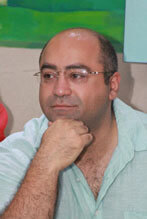Better dead than a coward
(and other papers on the sacrificial meaning of warfare) |
| Part III: Marklund - Roberts |
|
| James McPherson writes about Civil War soldiers who “went forward into a hail of bullets” because they were more afraid of being “known as a coward” than they were of death. What a strange form of masculinity—this willingness to die—that characterized both the Civil War and the First World War.
Today, things have changed profoundly. America’s military—after a brief period in which the sacrificial ideology renewed itself—continues to be dominated by a policy of “casualty aversion.” Nothing is worth dying for. Drones have taken the place of boots on the ground.
Can a nation exist if people are no longer willing to “die for the country?”
Please take your time reviewing the list of items below.
Then click through to read any document. |
|
|
|
| McPherson, James |
| • |
For Cause and Comrades: Why Men Fought in the Civil War (Book Excerpts) |
| |
“Civil War soldiers wrote much about courage, bravery, valor—the mark of honor. But they wrote even more about cowardice—the mark of dishonor. Most wanted to avoid the shame of being known as a coward—this is what gave them courage. Civil War soldiers went forward into a hail of bullets because they were more afraid of showing the ‘white feather’ than they were of death.” |
|
| Moghadam, Assaf |
| • |
Motives for Martyrdom: Al-Qaida, Salafi Jihad, and the Spread of Suicide Attacks (Paper) |
| |
Abdullah Azzam was the first theoretician to succeed in turning martyrdom and self-sacrifice into a formative ethos. It is largely because of him that self-sacrifice has become a moral code that al Qaida has used to justify suicide missions. More than any other individual, Azzam persuaded jihadis in Afghanistan and beyond that those who die for the sake of God (fi sabil Allah) will be rewarded in paradise. Azzam understood martyrdom not as involving suicide missions per se, but as the death of any “true” Muslim waging jihad. Such martyrdom would wash away the jihadi’s sins and bestow glory upon him. |
|
| Monnet, Agnieszka Soltysik |
| • |
War and National Renewal: Civil Religion and Blood Sacrifice in American Culture (Article) |
| |
Since the late 18th and early 19th centuries, patriotic sacrifice has been regarded as the noblest and most civilized gesture a man can perform for his country. Yet modern scholars of nationalism are at pains to account for the intensity of attachment that would induce individuals to die for their nation. Moreover, the specter of Japanese suicide pilots and Islamic airplane hijackers, whose deaths may be understood as heroic sacrifices in their own cultural contexts but as terrorism in ours, complicates the work of distinguishing “appropriate” martyrdom from religious fanaticism. |
|
|
| Pajari, Ilona |
| • |
Soldier’s Death and the Logic of Sacrifice (Paper) |
| |
The soldier’s death throughout history has been understood as a special kind of death. Death in war has been the surest way to heaven or similar otherworldly place; dead warriors have gained the admiration and gratitude of others. The age of modern nations may seem different from ancient tribal societies, but some things have remained the same. At least until the Second World War, many nations cherished the idea of a heroic soldier whose death would be a blessing, not only to the soldier himself, but to the entire nation which needs such pure sacrifices. |
|
| Rahimi, Babak |
 |
• |
The Transhuman Soldier: A Comparative Look at World War I and the Iran-Iraq War |
| |
With his sacrifice, the soldier transforms the ordinary cycle of existence into something livelier and more transhuman. His sacrifice on the battlefield becomes a creative event to conquer death. He attains a sacred quality with his ability to generate an all-too-superhuman vitality, a sacred death of transcendental reality. The act of sacrifice empowers the self of a soldier against the natural process of demise—and towards the creation of a transcendent entity. |
|
| Roberts, Michael |
| • |
Suicide Missions as Witnessing: Expansions, Contrasts (Paper) |
| |
This article surveys the literature on suicide missions in comparative perspective, focusing on a common feature, namely the affirmation of the justice of their cause by individuals and organizations deploying such methods. Insofar as these acts of witness provide evidence on the motivations of the suicidal activists, the argument is that scholars should move beyond the prevalent focus on suicidal attacks to embrace a complete range of suicidal operations that express justificatory testimony. |
|
|
|
